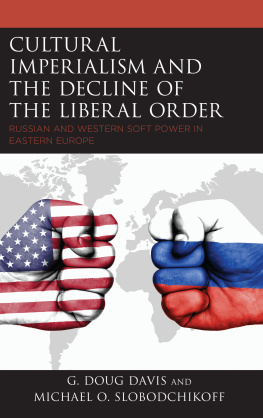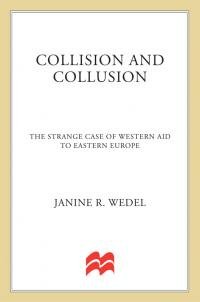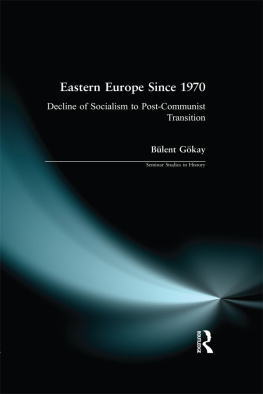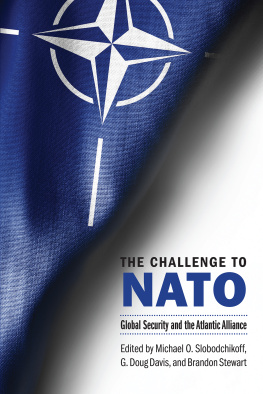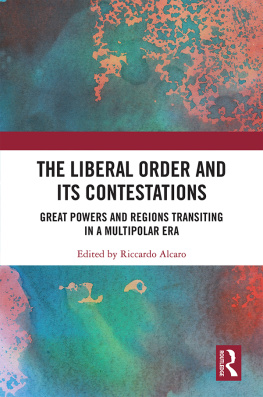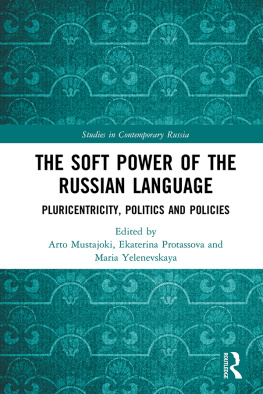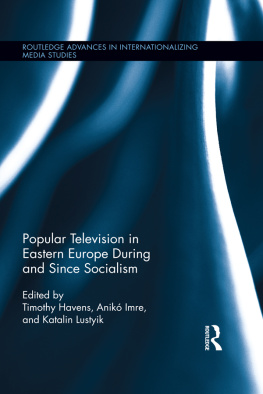G. Doug Davis and Michael O. Slobodchikoff - Cultural Imperialism and the Decline of the Liberal Order: Russian and Western Soft Power in Eastern Europe
Here you can read online G. Doug Davis and Michael O. Slobodchikoff - Cultural Imperialism and the Decline of the Liberal Order: Russian and Western Soft Power in Eastern Europe full text of the book (entire story) in english for free. Download pdf and epub, get meaning, cover and reviews about this ebook. year: 2019, publisher: Lexington Books, genre: Science / Politics. Description of the work, (preface) as well as reviews are available. Best literature library LitArk.com created for fans of good reading and offers a wide selection of genres:
Romance novel
Science fiction
Adventure
Detective
Science
History
Home and family
Prose
Art
Politics
Computer
Non-fiction
Religion
Business
Children
Humor
Choose a favorite category and find really read worthwhile books. Enjoy immersion in the world of imagination, feel the emotions of the characters or learn something new for yourself, make an fascinating discovery.
- Book:Cultural Imperialism and the Decline of the Liberal Order: Russian and Western Soft Power in Eastern Europe
- Author:
- Publisher:Lexington Books
- Genre:
- Year:2019
- Rating:4 / 5
- Favourites:Add to favourites
- Your mark:
- 80
- 1
- 2
- 3
- 4
- 5
Cultural Imperialism and the Decline of the Liberal Order: Russian and Western Soft Power in Eastern Europe: summary, description and annotation
We offer to read an annotation, description, summary or preface (depends on what the author of the book "Cultural Imperialism and the Decline of the Liberal Order: Russian and Western Soft Power in Eastern Europe" wrote himself). If you haven't found the necessary information about the book — write in the comments, we will try to find it.
G. Doug Davis and Michael O. Slobodchikoff: author's other books
Who wrote Cultural Imperialism and the Decline of the Liberal Order: Russian and Western Soft Power in Eastern Europe? Find out the surname, the name of the author of the book and a list of all author's works by series.
Cultural Imperialism and the Decline of the Liberal Order: Russian and Western Soft Power in Eastern Europe — read online for free the complete book (whole text) full work
Below is the text of the book, divided by pages. System saving the place of the last page read, allows you to conveniently read the book "Cultural Imperialism and the Decline of the Liberal Order: Russian and Western Soft Power in Eastern Europe" online for free, without having to search again every time where you left off. Put a bookmark, and you can go to the page where you finished reading at any time.
Font size:
Interval:
Bookmark:
Cultural Imperialism and the Decline of the Liberal Order
Russian, Eurasian,
and Eastern European Politics
Series Editor: Michael O. Slobodchikoff, Troy University
Mission Statement
Following the collapse of the Soviet Union, little attention was paid to Russia, Eastern Europe, and the former Soviet Union. The United States and many Western governments reassigned their analysts to address different threats. Scholars began to focus much less on Russia, Eastern Europe, and the former Soviet Union, instead turning their attention to East Asia among other regions. With the descent of Ukraine into civil war, scholars and governments have lamented the fact that there are not enough scholars studying Russia, Eurasia, and Eastern Europe. This series focuses on the Russian, Eurasian, and Eastern European region. We invite contributions addressing problems related to the politics and relations in this region. This series is open to contributions from scholars representing comparative politics, international relations, history, literature, linguistics, religious studies, and other disciplines whose work involves this important region. Successful proposals will be accessible to a multidisciplinary audience, and advance our understanding of Russia, Eurasia, and Eastern Europe.
Advisory Board
Michael E. Aleprete, Jr., Gregory Gleason, Dmitry Gorenburg,
Nicole Jackson, Matthew Rojansky, Richard Sakwa,
Andrei Tsygankov, Christopher Ward, Stephen K. Wegren
Recent Titles in the Series
Understanding International Relations: Russia and the World, edited by Natalia
Tsvetkova
Geopolitical Prospects of the Russian Project of Eurasian Integration, by Natalya A. Vasilyeva and Maria L. Lagutina
Eurasia 2.0: Russian Geopolitics in the Age of New Media, edited by Mark Bassin and Mikhail Suslov
Executive Politics in Semi-Presidential Regimes: Power Distribution and Conflicts between Presidents and Prime Ministers, edited by Mark Bassin and Mikhail Suslov
Post-Soviet Legacies and Conflicting Values in Europe: Generation Why, by Lena M. Surzhko-Harned and Ekaterina Turkina
Through Times of Trouble: Conflict in Southeastern Ukraine Explained from Within, by Anna Matveeva
Cultural Imperialism and the Decline of the Liberal Order: Russian and Western Soft Power in Eastern Europe, by G. Doug Davis and Michael O. Slobodchikoff
Cultural Imperialism and the Decline of the Liberal Order
Russian and Western Soft Power
in Eastern Europe
G. Doug Davis and Michael O. Slobodchikoff
LEXINGTON BOOKS
Lanham Boulder New York London
Published by Lexington Books
An imprint of The Rowman & Littlefield Publishing Group, Inc.
4501 Forbes Boulevard, Suite 200, Lanham, Maryland 20706
www.rowman.com
6 Tinworth Street, London SE11 5AL
Copyright 2019 by The Rowman & Littlefield Publishing Group, Inc.
All rights reserved. No part of this book may be reproduced in any form or by any electronic or mechanical means, including information storage and retrieval systems, without written permission from the publisher, except by a reviewer who may quote passages in a review.
British Library Cataloguing in Publication Information Available
Library of Congress Cataloging-in-Publication Data Available
ISBN 978-1-4985-8586-6 (cloth : alk. paper)
ISBN 978-1-4985-8587-3 (electronic)
 TM The paper used in this publication meets the minimum requirements of American National Standard for Information Sciences Permanence of Paper for Printed Library Materials, ANSI/NISO Z39.48-1992.
TM The paper used in this publication meets the minimum requirements of American National Standard for Information Sciences Permanence of Paper for Printed Library Materials, ANSI/NISO Z39.48-1992.
Printed in the United States of America
To our wives, Marinella and Tatyana,
whose presence makes each of us whole.
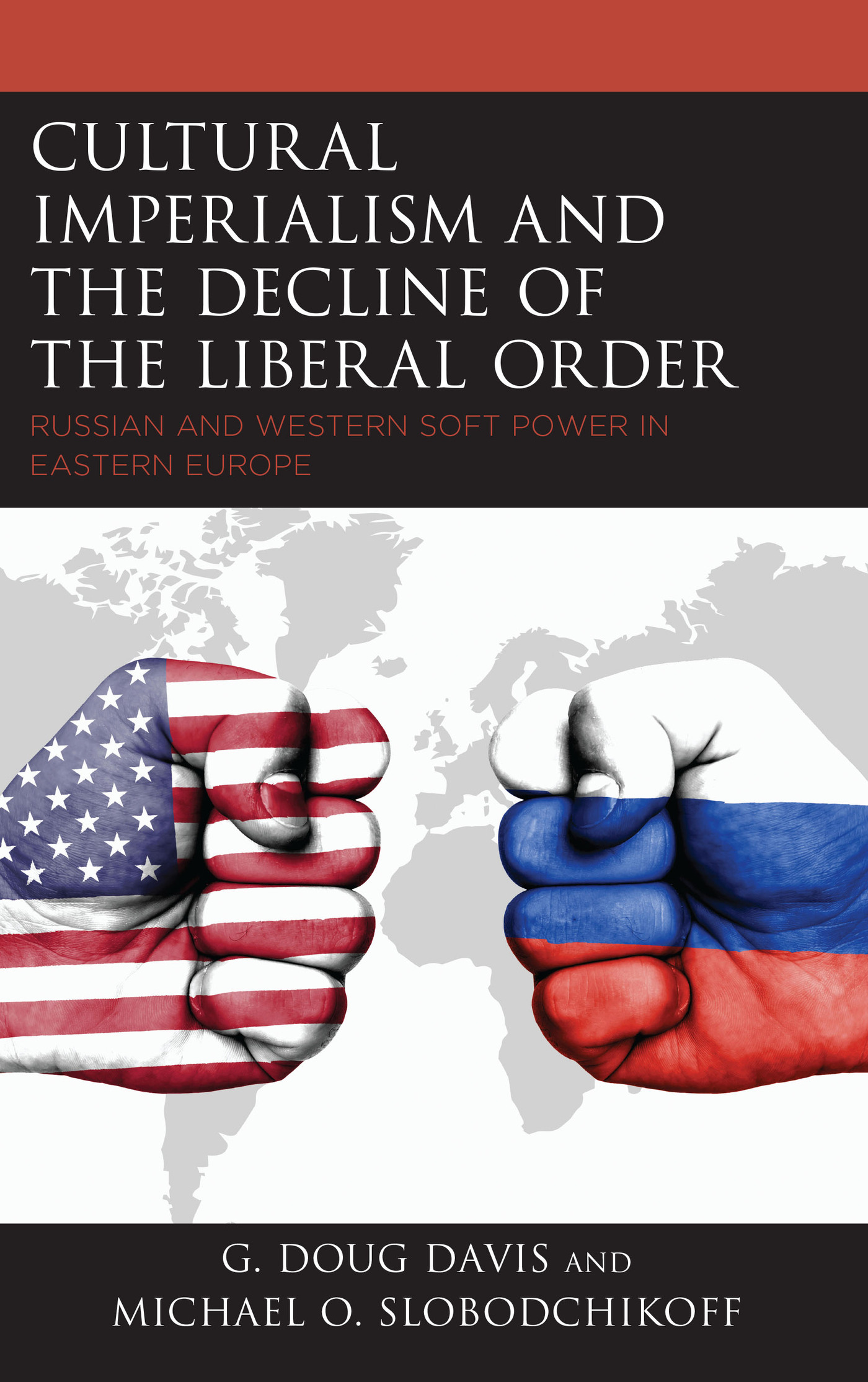
Writing a book is an incredibly difficult undertaking and is impossible without the help of many people and institutions. We are very grateful for the help of the Faculty Development Committee at Troy University, which provided funding for Dr. Davis in the form of a research grant. This grant led to the chapter on Poland. We are also thankful to the Faculty Development Committee for providing funding to present conference papers at the International Studies Association annual conferences. These conference papers and the feedback that we received from discussants and other colleagues at these gatherings were vital to making this book possible.
We are also very grateful to our colleagues in Eastern Europe, Russia, and the United States for providing feedback, discussion, and aid in the process of writing this book. We appreciate all of the suggestions, comments, and criticism that we have received along the way. We are also thankful for the research assistance provided by Ms. Alicia Rodriguez Castillo and Mr. Christian Knight.
The publishing process is a very difficult one. We appreciate the help and guidance of both Joseph Parry and Bryndee Ryan at Lexington Books for their aid in making this project a reality. We would also like to thank the anonymous reviewers who have read this book and provided valuable feedback, making it stronger.
Finally, wed like to thank our families for their patience, advice, and support during this process. They have made tremendous sacrifices for this project, and we would like them to know how much we appreciate them. Words dont have the capacity to express our gratitude to them.
The study of power is fundamental within international relations and scholars have long been interested in the relative power between states. Traditionally, most analysis has focused on economic or military prowess that can be harnessed and used to compel other countries to act in accordance with the interests of strong states. While the Treaty of Westphalia recognized state sovereignty, anarchy continued to exist at the global level. Classical realist and neorealist scholars recognized the lack of any authority in the international realm and the resultant lawlessness (Fearon 1995; Grieco 1988; Morgenthau 1948; Walt 2002; Waltz 1979); their insight shows how this chaos generates competition between countries. States must maximize their military and economic might to enhance their defense since no other partner can guarantee their survival in the international system. One problem is that as states military capacity increases, the security of other countries simultaneously weakens and this consequent vulnerability causes a security dilemma. and predicts that states will emphasize and expand their power at others expense, thus reducing the potential for cooperation as most international issues lead to a zero-sum gain where there are winners and losers to every international agreement. States following this paradigm will maximize their military and economic power at all times to enhance their strategic advantage over potential rivals.
In contrast to classical and neorealist academics, hegemonic stability scholars argue that while global anarchy exists, the historical record shows that it can be overcome. A hegemonic state can establish rules and get other countries to comply and abide by its rubrics. The dominant power creates an international order with clearly defined roles for all other states in the system and this works to solve the security dilemma as the hegemon declines over time due to the costs of maintaining the system (Kennedy 1989 and Gilpin 1981). If any one state violates the rules and the imposed order, the hegemon has the power to correct the errant behavior. States understand their roles and the structure provides benefits to them on condition that they operate according to the established norms. Specifically, scholars such as Kindleberger (1973, 1995) and Gilpin (1983), argue that the power of a hegemonic state creates both global stability and operative rules of interactions that reflect the preferences of the dominant country. The hegemons goal, therefore, is to maximize its power so that it can fashion its own global order, which in turn determines the rules of behavior for all other states within the system. A hegemonic state will institutionalize a system of rules and institutions that preserve and advance its goals and values. However, a hegemonic state cannot create a global order without enough power and influence to be able to both convince other states of the validity of such an order and the ability to enforce the rules of the global order.
Font size:
Interval:
Bookmark:
Similar books «Cultural Imperialism and the Decline of the Liberal Order: Russian and Western Soft Power in Eastern Europe»
Look at similar books to Cultural Imperialism and the Decline of the Liberal Order: Russian and Western Soft Power in Eastern Europe. We have selected literature similar in name and meaning in the hope of providing readers with more options to find new, interesting, not yet read works.
Discussion, reviews of the book Cultural Imperialism and the Decline of the Liberal Order: Russian and Western Soft Power in Eastern Europe and just readers' own opinions. Leave your comments, write what you think about the work, its meaning or the main characters. Specify what exactly you liked and what you didn't like, and why you think so.

